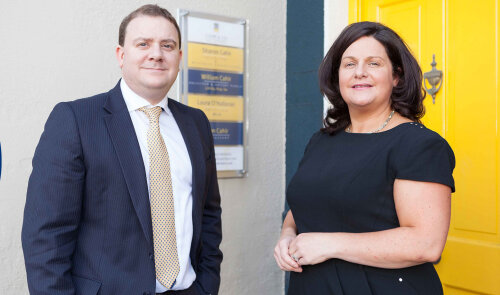Best Premises Liability Lawyers in Ennis
Share your needs with us, get contacted by law firms.
Free. Takes 2 min.
List of the best lawyers in Ennis, Ireland
About Premises Liability Law in Ennis, Ireland
Premises liability covers legal responsibility when someone is injured because of unsafe conditions on property. In Ennis, County Clare, as elsewhere in the Republic of Ireland, injuries that occur on private property, in shops, at rentals, on footpaths or in public spaces can give rise to a claim if the occupier or owner failed to take reasonable care. The law asks whether the occupier knew or ought to have known about a hazard and whether reasonable steps were taken to prevent harm. Common situations include slips, trips and falls, assaults in poorly lit or insecure places, and injuries from defective stairs, handrails or other structures.
Why You May Need a Lawyer
A solicitor can help you understand whether you have a valid claim, preserve and present evidence, and handle interaction with insurers and public bodies. Common situations where legal help is useful include:
- Serious injuries that cause hospital treatment, ongoing medical care or time off work.
- Disputes about who was responsible - for example claims involving Clare County Council, a private landlord, a shop, a hotel or a business.
- Cases where liability is disputed or where the other side says you were partly to blame.
- Incidents that involve complex factual reconstruction, CCTV, expert medical and engineering reports.
- Claims with time limits, or where you need to go through statutory procedures such as the Personal Injuries Assessment Board process.
Local Laws Overview
Key legal points relevant to premises liability claims in Ennis include:
- Duty of Care: The Occupiers Liability Act requires occupiers to take reasonable care to ensure that visitors are safe while on the premises. The standard of what is reasonable depends on the circumstances, the type of visitor and the nature of the hazard.
- Types of Claimants: Lawful visitors have a stronger protection. Trespassers have a more limited protection - occupiers must not intentionally or recklessly cause harm and in some cases must take minimal precautions.
- Statute of Limitations: For personal injury claims the usual time limit is two years from the date of the injury. Special rules apply for minors and for injuries that are discovered later - you should check your deadlines promptly.
- Pre-action Procedures: Many personal injury claims in Ireland require notification to the Personal Injuries Assessment Board or compliance with other pre-action procedures before court proceedings can be issued. These procedures affect timing, evidence and how compensation may be assessed.
- Public Bodies: If the incident involves public infrastructure - for example a pavements, road defect or public park - the relevant local authority is Clare County Council. Claims against public bodies can have additional procedural rules and timelines.
- Contributory Negligence: If you are found partly responsible for your injury your compensation may be reduced in proportion to your share of fault.
- Insurance and Liability: Most commercial premises and many homeowners have insurance that covers liability claims. Insurers normally lead settlement discussions and may appoint solicitors for the defendant.
Frequently Asked Questions
What counts as a premises liability claim in Ennis?
A premises liability claim arises when an injury is caused by a dangerous or defective condition on property you were using. Examples are slippery floors in shops, uneven pavements, poorly maintained stairs, broken handrails, inadequate lighting or hazards in a rented property. If the occupier or owner knew, or ought to have known, about the danger and failed to take reasonable steps to make the area safe you may have a claim.
Who can be sued if I am injured on someone else’s property?
Potential defendants include the occupier, the owner, a landlord, a business operator, or sometimes a management company. For injuries on public land the responsible body may be Clare County Council or another public authority. Identifying the correct defendant is important and can affect time limits and procedure.
How long do I have to bring a claim?
The general limitation period for personal injury claims in Ireland is two years from the date of the injury. Different rules apply for minors - typically the limitation period runs from their 18th birthday - and for injuries that are not discovered immediately, where the time limit may start from the date of knowledge. Because deadlines can be strict you should get legal advice as soon as possible.
Do I have to go to court to get compensation?
Not always. Many premises liability claims are settled with the defendant or their insurer before court. In Ireland there is a statutory pre-action process through the Personal Injuries Assessment Board for many types of claims, which encourages resolution without litigation. If settlement cannot be reached you may need to issue proceedings in court.
What evidence should I collect after an incident?
Collect as much information as possible: photos of the hazard and surroundings, contact details for witnesses, any accident report or incident book entry, CCTV or security camera details if available, medical reports and receipts, and names of staff or managers you spoke to. Preserve clothing or shoes if they are relevant. Early evidence helps build a stronger claim.
What if I was partly to blame for my injury?
If you were partly responsible the court or assessor can apply contributory negligence and reduce your award by a percentage that reflects your share of fault. A solicitor will help present evidence to limit any finding of contributory negligence.
How is compensation calculated?
Compensation usually covers general damages for pain, suffering and loss of amenity, and special damages for financial losses such as medical expenses, travel, rehabilitation and loss of earnings. The amount depends on the severity and permanence of injuries, prognosis, and objective medical evidence. PIAB assessments and court awards take these factors into account.
Do I need a solicitor to make a claim?
You do not strictly have to use a solicitor but having an experienced personal injuries solicitor is highly recommended for anything beyond minor injuries. Solicitors handle evidence gathering, correspondence with insurers, medical and expert reports, the PIAB or court process, and can advise on settlement offers and legal costs.
What if the incident happened on a public pavement or in a public park?
If your injury is linked to public infrastructure you should report the incident to the local authority - Clare County Council - and to An Garda Síochána if appropriate. Claims against public bodies may involve different pre-action notices or short notice periods, so early legal advice is particularly important.
How long does a premises liability claim usually take?
Timelines vary with the case complexity. Minor injuries with clear liability may settle within months. More serious or disputed claims that require medical or technical experts, or that go through PIAB and then court, can take a year or more. Your solicitor can give an estimate based on the likely evidence and whether liability is admitted.
Additional Resources
Useful local and national bodies and resources you may consult include:
- Clare County Council - the local authority responsible for roads, pavements and many public amenities in Ennis.
- An Garda Síochána - to report incidents that require an official police report.
- Personal Injuries Assessment Board - for pre-action assessment procedures in many personal injury claims.
- Citizens Information - for general information on rights, time limits and public services.
- Law Society of Ireland - for guidance on finding and selecting a solicitor and for regulatory information.
- Bar of Ireland - for information about barristers and advocacy, where court proceedings need specialist representation.
- Health Service Executive - for health services and records related to treatment after an injury.
- Health and Safety Authority - for workplace and safety standards if your injury relates to a workplace or public safety matter.
Next Steps
If you or a loved one has been injured on premises in Ennis follow these practical steps:
- Seek medical attention immediately and follow medical advice. Keep records of all treatment and invoices.
- Preserve evidence: take photographs, keep damaged clothing, get CCTV details if possible, and obtain witness contact information.
- Report the incident to the premises manager or proprietor and ask for an incident report. Report public hazards to Clare County Council and consider notifying An Garda Síochána where appropriate.
- Contact a solicitor experienced in premises liability and personal injury law early, particularly to check time limits and whether a PIAB application is required.
- Keep a detailed diary of symptoms, appointments and losses related to the injury.
- Do not sign any admission of liability or full and final settlement without legal advice. If an insurer contacts you, refer them to your solicitor.
Getting timely legal advice will help you protect your rights, preserve crucial evidence and aim for a fair outcome. A qualified solicitor can explain options, costs and likely timelines based on the specific facts of your case.
Lawzana helps you find the best lawyers and law firms in Ennis through a curated and pre-screened list of qualified legal professionals. Our platform offers rankings and detailed profiles of attorneys and law firms, allowing you to compare based on practice areas, including Premises Liability, experience, and client feedback.
Each profile includes a description of the firm's areas of practice, client reviews, team members and partners, year of establishment, spoken languages, office locations, contact information, social media presence, and any published articles or resources. Most firms on our platform speak English and are experienced in both local and international legal matters.
Get a quote from top-rated law firms in Ennis, Ireland — quickly, securely, and without unnecessary hassle.
Disclaimer:
The information provided on this page is for general informational purposes only and does not constitute legal advice. While we strive to ensure the accuracy and relevance of the content, legal information may change over time, and interpretations of the law can vary. You should always consult with a qualified legal professional for advice specific to your situation.
We disclaim all liability for actions taken or not taken based on the content of this page. If you believe any information is incorrect or outdated, please contact us, and we will review and update it where appropriate.










